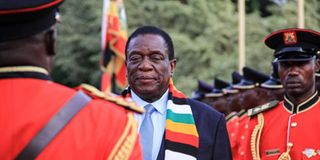Premium
Zimbabwe crafts law to punish 'unpatriotic' citizens

Zimbabwe's president Emmerson Mnangagwa (2nd L) reviews a guard of honour at the state house during his official visit to attend Uganda's 57th independence day in Entebbe, Uganda, on October 8, 2019.
What you need to know:
- The proposed law will criminalise corresponding with a foreign government without approval.
- It will also criminalise making false statements that harm the country and conniving with hostile foreign governments to harm the country.
Zimbabwe is crafting a law that will punish citizens who communicate with foreign governments and “harm national interests” as President Emmerson Mnangagwa steps up an ongoing clampdown against dissent.
A senior government official on Sunday said the new Patriot Bill was at an advanced stage.
The proposed law will criminalise corresponding with a foreign government without approval, making false statements that harm the country and conniving with hostile foreign governments to harm the country.
"The Bill is premised on the constitutional provision on the foreign policy of our country, which values the promotion and protection of the national interests of Zimbabwe," Justice, Legal and Parliamentary Affairs secretary Virginia Mabhiza told state-controlled media.
"It is the duty of the state to engage other sovereign nations on issues pertaining to foreign nations, and not self-serving citizens.
"Private citizens will have to avoid conduct such as travelling to foreign countries as self-appointed ambassadors, meeting foreign officials to undermine the national interest."
President Mnangagwa’s government says the proposed law is inspired by the United States' Logan Act.
For years, the ruling Zanu PF has accused the opposition of campaigning for Western sanctions against Zimbabwe.
Zimbabwe has been under targeted sanctions from the US, the European Union and other Western countries for over a decade for allegedly rigging elections and violating human rights.
Since taking over from long serving strongman Robert Mugabe in a military coup in 2017, President Mnangagwa has been pushing for re-engagement with the international community.
The 77-year-old ruler, however, has little to show for his efforts, as western countries continue to shun his government, citing lack of reforms.
Recently, Zanu PF threatened to throw out US ambassador to Zimbabwe Brian Nichols for allegedly working with the opposition to foment chaos.
Three female opposition activists, who were abducted and sexually abused early this year are now being charged for allegedly faking their ordeal to soil Zimbabwe's image.
Mrs Mabhiza said the proposed law will impose stiff penalties on those found "conniving" with foreign powers.
"Conniving with foreign governments and nationals to inflict harm on the country and its citizens will be criminalised," she added.
Last month President Mnangagwa threatened to extradite loyalists of the late Mr Mugabe after accusing them of influencing South Africa to adopt a tough stance against Zimbabwe.





